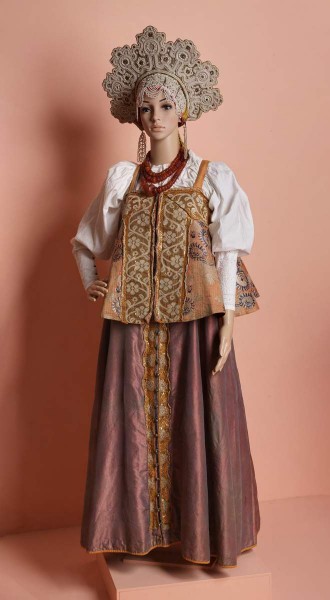Wedding Dress
Pinega District, Arkhangelsk Gubernia. 19th century
- Passementerie, foil, fringe, fabric, mother of pearl, beads, braid, stringing, laid embroidery by beads, pearls, spangles, stringing, fabric, embroidery, silk, galloon, taffeta, metal buttons
- Гр.Б-1336; В-7664; В-6818; Гр.Б-1714; Тк-1178
Maiden’s Headband
Passementerie, foil, fringe, fabric, pearls, beads, stringing
Wedding Headdress ‑ Venets
Laid embroidery by beads, pearls, spangles, stringing
Bride’s Kerchief — Shirinka
Flax, stitching
Shirt
Linen, embroidery
Dushegreya
Late 18th century
Silk, galloon
Sarafan
Taffeta, galloon, metal buttons
One of the ceremonies in a Pinezhye edding was the ritual of smotrenye (viewing of the bride), when the bride-to-be “adorned and glowing, like a firebird” was taken to her husband-to-be and his family. On top of her gold band the maiden wore a large flat crown woven with pearls. The bride bowed to every guest while one of the female wedding guests supported her magnificent construction.
Expensive factory-produced cloth such as damask, brocade and taffeta were used in the grand festive costume of the women of Archangelsk Gubernia, both in the city and country. Brocade was commonly used to make sleeveless jackets. Taffeta was called “double-sided silk” as it was made from a thread base and weft of two colors, giving the cloth an iridescent quality, making the folds shimmer with different shades. Damask is a fine flower-patterned cloth, usually made from silk in a single color. It is known for its mixture of shiny patterns on a matt background on the outside and matt patterns on a shiny background on the inside.

